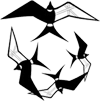![]() Vulture Restaurants
Vulture Restaurants
[The Namibian
– 10 June 2010]
Waltons Stationers Namibia, in support of threatened and endangered species, has sponsored a pamphlet for farm owners and managers on vulture feeding stations also known as “vulture-restaurants”. Information in the pamphlet explains the usefulness of a vulture restaurant to conservation efforts as well as the agri-economic incentives for farms. The pamphlet also gives ideas on how to set up the site.
Law protects all bird of prey species occurring in Namibia. Whether they are migrant visitors or resident species they are all at risk of collision with vehicles, striking an overhead power or telephone line, being electrocuted on a power utility or finding a prey item or carcass contaminated with a veterinary drug or a chemical poison. These risks are major influences for the decline seen in populations of large birds of prey.
Conservation of wildlife includes maintaining natural habitats, supporting natural life styles, removing known threats and developing current knowledge of a population’s conservation status and the status of its’ life-support systems. The threats to vulture populations in Africa, in Europe, in Asia and in the Americas have been known for decades and cooperation has been sought from landowners and managers to deal with some of the obvious risks. The idea of a feeding-station as a conservation strategy for vultures was first tried in South Africa in 1966. Namibia’s first formal feeding- station was set up on the Waterberg Plateau Park in 1978 for the now nearly extinct in Namibia, Cape Vulture population. Vulture restaurants do provide a number of opportunities for conservation of these magnificent birds, depending on how they are managed and how the information collected at these sites is shared.
Many Namibian landowners and managers are committed to ensuring the safety of wildlife populations but must at the same time be able to justify actions in terms of farm income. Besides the conservation value, a vulture-restaurant provides economic value through increased potential for income diversification. By maintaining a vulture-restaurant or supporting a neighbor’s restaurant, farmers give themselves a practical, economical, and hygienic carcass disposal method. If a viewing hide is built then the farms attractiveness as a tourist destination is increased.
A viewing hide allows fascinating observation and photographic opportunities that can otherwise seldom be had. Many vultures and a number of eagles are in the CITES (Convention for Trade in Endangered Species) endangered and threatened conservation categories. Keeping a record of the species and the number of birds using the feeding site will assist current and future conservation strategies. Most importantly everyone is given an opportunity to add to the current knowledge base by noting any ringed and tagged birds and by simply recording the number of birds using the feeding site. The records of numbers of birds, ringed and tagged birds as well as other scientific studies possible at vulture restaurants are important data for future conservation of these species.
The Waltons Stationers
Namibia sponsored pamphlet was developed by Liz Komen, NARREC (Namibia
Animal Rehabilitation, Research and Education Centre). The information
provided includes basic ideas for setting up the site, developing a viewing
hide, the information that should be recorded, the contacts of the organizations
that collate this information such as Vultures Namibia and Safring and
importantly a section on veterinary medicines used in livestock farming
that can create a lethal situation for scavenging birds. Vulture restaurants
must be included in the current conservation vision for vultures in Africa,
not because these feeding stations will secure enough safe uncontaminated
food for vultures, but because these restaurants provide a unique space
to observe and monitor populations and because of the positive spin-off
of an added attraction for tourism. Now more than ever attracting vultures
makes farming sense for income diversification as well as to satisfy increasingly
knowledgeable touring groups.
If you have any queries or any information please call:
Liz at NARREC: 081 129 0565 liz.narrec@gmail.com
Peter at Vultures Namibia: 081 260 7375 pmbridge@iway.na
 Liz
Komen
Liz
Komen
NARREC